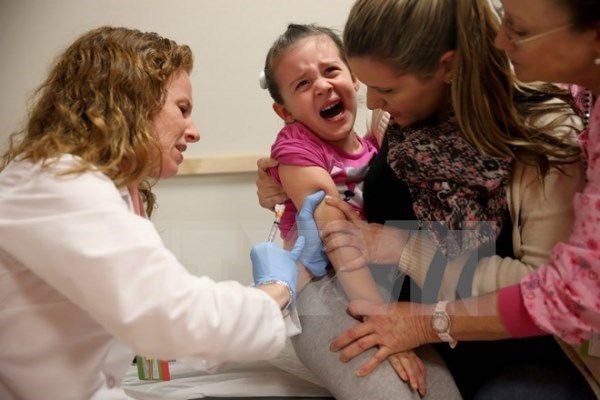Measles increases the risk of other infectious diseases
Scientists have long believed that measles weakens the body's natural immune system for several months. However, American scientists have recently concluded that this infectious respiratory disease can destroy the immune system for up to three years, increasing the risk of other infectious and serious diseases for the patient.
 |
| Measles vaccination at Children's Hospital in Miami, Florida, USA. (Source: AFP/VNA) |
To reach this conclusion, a team of researchers from Princeton University conducted a study of data collected over several decades on deaths in children aged 1-9 in Europe and children aged 1-14 in the United States, both before and after measles vaccination. The results showed that the measles virus destroys the immune system of the patient for an average of 28 months after infection.
During this time, children with measles are at high risk of dying from other infectious diseases such as pneumonia, bronchitis, meningitis, diarrhea, parasitic diseases... The reason is that the measles virus attacks and destroys memory cells in the immune system, which are responsible for protecting the body against infectious diseases.
Michael Mina, an infectious disease and immunologist at Princeton University and the study’s lead author, concluded that the measles vaccine not only protects against measles but also many other deadly infectious diseases. According to the expert, the measles vaccine is one of the most beneficial medical interventions for public health.
The study was published in the May 7 issue of the American journal Science, amid concerns among public health officials that more and more parents are refusing to vaccinate their children against measles.
In 2000, the US government declared measles eradicated. However, measles cases in the US have skyrocketed in recent years, and this situation coincides with a trend of people refusing to get vaccinated against measles due to concerns that the vaccine may cause mental illness.
Last year, US authorities detected 668 cases of measles, a record high since 1994. Although scientific studies have ruled out any link between the measles, mumps, and rubella vaccine and mental illness, the trend of refusing to get vaccinated has continued to be widespread in recent years in the US.
Measles is a highly contagious disease, the virus can spread through the air without direct contact. The disease usually starts with a fever, followed by cough, runny nose, conjunctivitis and rash. Measles can lead to serious complications such as lung infections.
According to data from the World Health Organization (WHO), during the period 2000-2013, measles vaccine helped reduce deaths from this disease by 75% worldwide./.
According to VIETNAM+






